Welcome
On this site you'll find posts and pages from recent years. The site began as part of my public law practice after leaving Parliament in 2005. Accordingly it records my opinions, not necessarily those of Franks & Ogilvie of which I am a principal, or any client, or the National Party for which I contested the Wellington Central electorate in November 2008.
From the Wellington Writers’ Walk:
“It’s true you can’t live here by chance, you have to do and be, not simply watch or even describe. This is the city of action,the world headquarters of the verb”
– Lauris Edmond, from The Active Voice
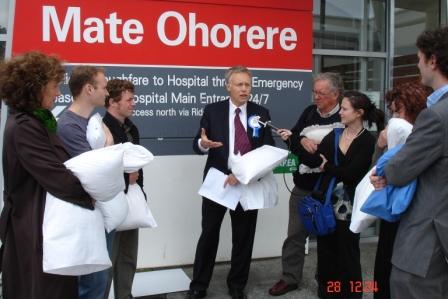
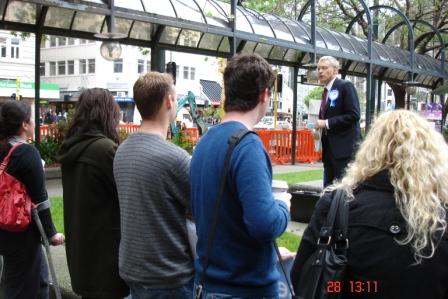
I’ve spent this morning outside the Wellington Hospital and in Midland Park highlighting the appalling health care shortfalls in Wellington. If it wasn’t for the dedicated staff who have kept the hospital and health services going, patients would be getting even slower treatment and care.
My team today had pillows with them to highlight the long hours and even days people may have to wait to be seen at the Hospital.
One of our campaign team brought it home to us. She was in the emergency department for 48 hours because there was no room in the wards.
So we think it is a good idea to grab a pillow before dialing 111, as you could wait for days, with no guarantee there’ll be enough beds once in hospital.
I wanted to highlight the fact that the new hospital has fewer beds for patients, despite the aging population. The new Children’s Hospital was cancelled and the money squandered elsewhere.
This morning’s Dominion Post front page story of fatal failure is another in a long series of reports.
I get more questions and comments about this issue while I’m canvassing than any other. Senior medical staff have made a point in coming to me with their view of the situation.
You can’t keep blaming the staff. Labour should be unelectable in Wellington if elections hold local politicians accountable for what has happened on their watch. It’s shameful. Where was local Labour while all this was going so wrong?
I’ve heard the Wellington Central Labour candidate trying to justify the shrunken hospital. He says people can ‘go to Kenepuru instead, or they’ll be cared for in the community’.
Annette King was the Minister of Health while the shrunken hospital plans were finalised. What part of ‘the community’ will give our aging population more beds? Did she expect no growth in Wellington?".
People are even being sent to Australia for services. There’s a small consolation for those who want a New Zealand trained doctor. Australia is where many of our doctors and nurses have gone.
Having helped run a big law firm, I expect professionals to have the final say. I’m struck by the helplessness of frustrated doctors and nurses who are subordinate to non-medical management. And even good management has to dance to the tunes of political theory.
Wellington’s leadership has been unbelievably passive over the deaths caused by substandard local services. Wellington deserves so much better, including a local MP who’ll stand up and fight for Wellington. I’ll do that, without fear or favour.
Our National team’s sign surveillance delivered an arrest early this morning in Newtown.
This long weekend saw a 90% reduction in the destruction of our signs. It appears that costs of destruction have been substantially reduced for other parties. Only on one site last night (Wadestown) were all except Labour’s signs destroyed.
We’re protecting freedom of expression. It is vital to everyone who believes in elections without coercion, whether you think signs are useful or not. Some parties whose budgets would not stand the cost of continual sign replacement will remain visible..
And we’ve cut the waste plastic going to the tip.
But law and enforcement can’t work long term without a practical consensus. Respect for others, for their rights to express opinions and respect for their property should concern all candidates.
So I’ve invited other candidates to join with National in this effort. I’ve asked them to contribute volunteers and to share the costs and the results of the infrared camera hire. Here is the invitation. One other candidate has accepted the invitation already.
I’d like to think most candidates can show New Zealanders’ traditional tolerance and respect for the rights of those we disagree with. “Whatever it takes” is not yet embedded as the governing principle for elections.
Dear Linley
You’re right. I am courting your affections (along with the other 50,000 voters in Wellington Central). I am glad you’ve taken notice of my ardour. It is genuine. What more must I do to persuade you (and 50,000 others) to listen to my poetry?
All I ask is a vote (or two) on Election Day. I won’t go away, like all the others. I’ll be here, working for you (and the 50,000 others). I promise to stop pursuing you (and 50,000 others) after the Election. Until then….
Yours earnestly
Stephen
PS I’m pacifying Catharine, but she need not know how you vote.
People often say they will vote for candidates who give simple yes/no answers and promises. The following exchange [edited down] was typical:
"I would like an MP who will support green energy choices. Would you ever vote in favour of further fossil fuel development? If you can assure me that your answer will be "no" then I will vote for you. [Is] the National position ‘that renewable energy is in favour but not at the expense of the economy’ effectively saying that fossil fuels will continue to develop?"
"Though I would love to be able to give you that assurance I am straightforward. ‘No’ would be a lie from any party.
There are circumstances in which all parties will support further fossil fuel development, whatever they say now.
For example, no party unequivocally opposes oil exploration. Oil extraction often produces gas, unavoidably. Appallingly this gas is commonly flared (burned at the wellhead) because it is less valuable than the oil. NZ Oil and Gas is doing this with its current major find, while they negotiate to pipe it ashore for burning in a power station instead. No sane person would oppose ensuring generation capacity to avoid wasteful flaring.
Equally, if we are to increase our reliance on wind and even solar, paradoxically we will need more quick response back-up. Gas turbines are the common back-up around the world.
Some power saving schemes can increase fluctuations in demand, if the easiest saving is at existing times of low demand.
So we might find there will be some new efficient thermal generation as part of a package designed to reduce overall thermal generation (like replacement for Huntly Coal).
Here in NZ we should be able to use hydro as back-up, but we have comparatively little hydro storage. Most of our hydro relies on water coming in to the dams almost as fast as it goes out. So again there will be a choice – different kinds of dams and more shorelines of lakes that go up and down, or using thermal.
It is different for non-democracies but any durable environmental policy must retain public support. As a democracy our people will simply not tolerate a government that would allow industry to go offshore (often to countries where the production could be less carbon efficient than here – thus a net carbon detriment for the globe) if the result is relative impoverishment. Accordingly any energy plan that will eventually have us on renewable must have a transition that keeps us in the ranks of the countries rich enough to afford the new technologies.
Our current Kyoto quandary is a good example of allowing slogan thinking to rule a few years ago. We are about to pay up to $1bn in Kyoto penalties because our emissions have risen (faster then George Bush’s USA – to our shame). The main cause has been Labour dithering for years before assuring our would-be forest planters and owners that they would not be robbed. The net beneficiaries of our Kyoto penalties could be Russian oligarchs who happen to have forests they say they are protecting.
That money would have had far more carbon reduction effect if it had been applied to a couple of hydro or wind or tide projects here, but our eagerness to sign up all those years ago has left us spiking our own ability to help the planet, and left the Aussies and others who were more shrewd, with the freedom to apply their money to actually reducing their emissions.
I commit to apply my heart and mind to what will actually happen out of legislation that comes before me, rather than judge it by the simple claims and slogans of the well-meaning people who promote the bills.
A good example to me of a tragic commitment to a slogan solution has been the green vote for bio-fuels. They may genuinely believe in their stipulation that our imports of bio diesel come only from sustainable sources. In practice as there is a global market. What we buy from such sources will simply push up the global price, thus increasing the current iniquitous conversion of corn to fuel in much the same way as if we had been buying converted wheat ourselves."
I’m glad to say that this questioner was satisfied, this time.
Massive interest in the sign vandals. Some of the comments were thoughtful.
‘Diane’ speculated: "Isn’t this sort of vandalism the sort that crime fighters are talking about nipping in the bud.
…..I believe this sort of behaviour can be the starting point of really anti-social behaviour for those that are inclined to the criminal side of life. For those whose personalities thrive on thrills and danger may find that vandalism becomes ho-hum boring and look for bigger ‘hits’ to provide the thrills."
Broken Windows policing theory holds that people inclined to prey on others will look for environmental indicators of the level of risk when deciding how far they can go. They try to pick up the norms in the neighbourhood.
The theory holds that persistent graffiti and un-repaired vandalism are a public confirmation that rules are not enforced, that other predators are getting away with it. So predation escalates as successive levels of otherwise marginal offenders join in. The huge reduction in New York crime followed a determined official attack on all low level signs of social disorder, with immediate cleaning of graffiti, and rigorous enforcement of petty offending rules.
That success came after decades of fruitless squad policing focus on "serious crime".
Wadestown experience may support that theory. Wadestown people tell of a general increase in vandalism and graffiti over several weeks. It may be associated with the sight of trashed billboards in that suburb morning after morning.
We think the Wadestown hoarding destruction is separate from the systematic campaign against our signage elsewhere. The methods have differed.
It may be just an a local snob who thinks his suburb is above the vulgar enthusiasms of electoral politics. He need to assert dominance by destroying the impudent intrusion of messages in his territory. But the consequence may be greater threats to his patch, as emboldened petty criminals become less petty.
I’m still inclined though to tolerate low level interference with our signage. We did not put effort into trying to catch the early artists. The photo below was shown to TV3’s Stephen Parker as a benign example.

I liked the Bill Hammond ‘parrot’ on my shoulder.
Stuff picked up Stephen Parker’s TV3 interview report.
The DomPost did not even call to get supplementary comment. They had a delightful hoarding story yesterday on the Bowie family political tussle, but odd that they’ve otherwise largely avoided the election in their backyard. By not covering the suburban multi-candidate meetings they missed some superbly timed one-liners from Independent candidate Al Mansell.
These vandals were captured by our infra-red camera destroying one of our election hoardings with a box knife 11 days ago. Do you know them?
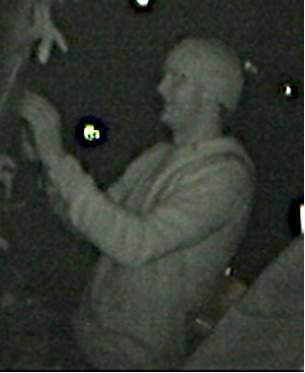
.png)
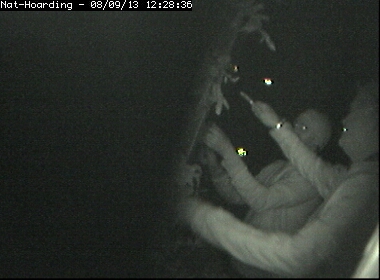
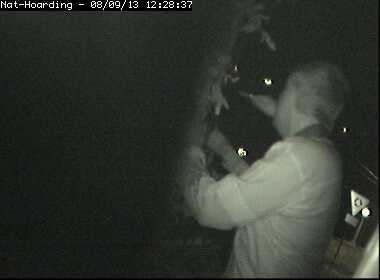
I would have overlooked some of the more clever ‘art’ on the signs. Indeed some of the early indelible pen work was so good I did not like to see it cleaned off. But the thuggish destruction is chewing up the donations and voluntary effort of people of all parties. Prosecution is needed.
It is time for the Police to be involved. Vandalism of $1000 per week may be routine for some of our long-suffering property owners. The Police may be weary of finding minor offenders then seeing them recycled immediately because our youth justice system favours feeble excuses, but the public is sick of it.
We have been able to keep replacing the signs, but I know that smaller parties are actually having their message successfully suppressed. The money for every political party comes from generous individuals who want to see changes in New Zealand, whatever their political persuasion.
We plan to catch these political thugs who don’t like free speech or opinions different from their own. If the Police choose not to treat it seriously there is always private prosecution.
The boys below* were in a separate group disturbed defacing one of our hoardings last weekend, followed and photographed. Do you know who they are?
If you know them, please warn their parents.
*[I’ve met with two of the boys. They’ve apologised and their pictures have accordingly been removed. SF]
Yesterday the NZ Institute of Chartered Accountants circulated a warning to its members to steer clear of the statutorily required filing of election returns of expenses required under the Electoral Finance Act.
I can’t think of any such blunt warning from any professional body in New Zealand in my working lifetime. Here it is:
"…. only those members experienced in audit work should contemplate accepting such appointments and all relevant auditing standards should be applied, as appropriate. Irrespective of the competence issue, there is a further issue to consider if you are approached to accept appointment. As noted below, it is highly likely that the result of the “audit” will be a disclaimer of opinion. In this situation a member must consider how appropriate it is, applying the Fundamental Principles in the Code of Ethics, to accept an appointment to “audit” subject matter information that is inherently unauditable. Indeed AS-702 states that when the proposed terms of an audit engagement include a limitation on the scope of the auditor’s work such that the auditor believes the need to express a disclaimer exists, the auditor should normally not accept such a limited engagement, unless required to do so by statute.
There will be some members who are already auditors of electoral parties or ‘third parties’ (eg certain trade unions) and so will not have the option of declining the engagements under the Electoral Finance Act. Of immediate concern is the audit report required on election expenses. The return is due to be filed with the Electoral Commission within 50 working days after the declaration of the outcome of the election. In it, the auditor is required to:
§ State the position shown by the return in respect of the requirement that the party’s total election expenses not exceed the relevant maximum amount specified in the Act; and
§ State whether, in the auditor’s opinion the position stated is correct; OR state that the auditor has been unable to form an opinion as to whether the position is correct.
We believe that auditors will have little choice but to state that they have been unable to form the required opinion (ie disclaim any opinion) for the following reasons:
§ There is currently significant uncertainty surrounding what constitutes an election advertisement.
§ The risk surrounding completeness. It is difficult to envisage any situation where the auditor would be able to perform audit procedures to give assurance that all expenses have been recorded in the returns – how to establish how many advertisements exist and then how to conclude that all expenses associated with each advertisement are included (particularly where some materials or space has been provided at no charge).
§ Difficulties in establishing the commercial value of materials or advertising space provided free of charge.
§ Difficulties in the apportionment of election expenses of election activity between individual candidates and the party as a whole.
§ It is possible that public funds may have been used for electioneering (as the Auditor-General determined to have happened after the 2005 general election). No auditor reporting under the Electoral Financing Act will be able to obtain assurance that public funds have not been used in advertisements intended to persuade a voter to favour a candidate or party in an election unless they audit the Parliamentary Services.
We note that a disclaimer will most likely be the appropriate form of opinion even in situations where the party or third party involved has implemented strict controls and done everything possible to ensure that the return is as accurate as possible.
Clearly this is an unfortunate situation and could have negative connotations. Those reading the report may misinterpret the opinion (or lack of an opinion). This is of particular concern given the highly politically sensitive nature of the information contained in the returns and the possibility of high media attention. The Institute has formally raised this with the Electoral Commission and are attempting to meet with the Chief Executive to discuss this further with her."
It is a disgrace to New Zealand democracy, that our audit standards body is saying that an election law is so defective that a prudent auditor should refuse to get into the position where they might have to give an opinion on how it is applied.
What a hurdle the law is to challengers to the political establishment wanting to make sure they do not render themselves liable to huge fines or imprisonment. Even if they could afford professional advice, the professionals are saying many of the questions are inherently unknowable. Establishment insiders of course have party structures and systems to form a consensus on what risks are being run.
Every party and every candidate must find some poor sod to give that sign-off opinion if they are to participate in our democracy. Belatedly the accountants are saying – find someone silly, but not us.
I’ve just come back from a multi-candidate meeting with the year 9 girls of Wellington East in my suburb of Mt Victoria. The girls have been studying the election process for some time.
I have been to events there, but never spoken in the Hall. As the official greeter students escorted us through the school I thought of how many girls must have done similar things since my mother was a student there during World War II. She told us stories of going to trenches during air raid warnings, and being there when a big earthquake toppled some brickwork.
National, the Greens, ACT and Labour candidates presented short speeches and were questioned. The girls are going to vote in their own poll on 8 November. For over an hour they concentrated hard (as far as I could tell).
School student discussion can be more satisfying than such meetings with adults. Questions at suburban multi-candidate meetings are mostly partisan attempts to embarrass the target, not to get information.
School questions are genuine. The students want to know things so they ask simple questions that are actually harder to answer – like "what is the practical difference between what you are promising and what the others are promising for school education?" or "how would you make things better in health when there is never enough money".
They politely clapped the usual recital from the big-promising parties (Labour and the Greens) of things we would all like to see. But follow-up questions made it plain they they knew such lists of desirables may not be persuasive without indicating relative priorities, or saying how they will be paid for.
I’ll be interested to hear how the girls vote.
Neil Harrap is a friend. He’s also a public campaigner against cycle helmets – because he hates the police having power to stop him choosing to do something that can harm nobody but himself.
So I’m delighted to pass on to Neil today some serious support for his crusade. At the Traffinz Conference in Wellington this morning the Transport Safety Minister Hon Harry Duynhoven, questioned the mandatory helmet law. He plainly considers it to be of debateable net value.
Harry will be a loss to Labour though its leadership will probably celebrate. He often says what he thinks. He does not run a focus-grouped ruler over his peeves and enthusiasms. He is detested by the PC mob who’ve taken over the Labour Party, and reciprocates (though feebly because he is too nice to hate much).
Harry responded this morning to a question about cutting greenhouse gas emissions from transport. He referred to the low level of bicycling in New Zealand, especially by women, who hate wearing helmets. He compared it to cycle use in Germany, France and other huge European countries where there is no helmet compulsion. He did not explore why women in particular do not like helmets, but if the women I know are typical it is not mysterious – hat hair.
I consider my helmet to be a trifling annoyance compared with its protection. It has saved me from several hard knocks.
But Neil, and now Harry have principle on their side. The law might still be justified pragmatically. But not if the cost/benefit of the helmet law is negative because it cuts participation in a healthy and environmentally friendly activity while cycling head injuries prevented are statistically few.
Presumably the Minister could easily ask his colleague the Minister of Health for the figures. He must have done some research before flying a kite that will surely get him into strife with the Labour strategists.
Maurice Williamson, who was also at the conference told me that he once received a report as Minister recommending mandatory helmet wearing in cars. He did not need to sound out his wife before rejecting it.
We speculated that the Greens could score a double hit if they made helmet wearing compulsory in cars but not on bikes or on public transport. Women might switch en masse to biking and buses.
That is no more bizarre than the law taking effect in February to regulate the depth of your bath water by restricting your hot water cylinder size unless you have a large house.
Door to door canvassing has daily highlights as well as some lower moments.
A delightful woman welcomed my appearance at her door in Karori yesterday with "How nice to have you here, Mr Franks. The last politician who took the trouble was Hugh Templeton. It must be fifteen years ago, when he was the MP".
I did not point out that it was 24 years since he was the Member for Karori (1975 to 1984). But I could tell her that it could have been the Hon Hugh Templeton knocking on her door again, because he was out with us for National (and me) yesterday in Karori.
I can scarcely think of a more genuine honour than to have a former Minister so active. Five former Ministers give practical help, but Hugh’s canvassing was still unexpected. I hesitate even to notify the former MPs on my helper list when the team is gathering because I feel they have more than paid their dues in earlier years of service.
We had the honour of two former MPs on the job again at the same time yesterday, as Lt Col Rob Munro was also with us. He served as MP for Invercargill for 6 years. The Invercargill electorate was next to the seat of Awarua, which Hugh represented before taking the Karori seat.
A funny lower moment involved a polite and pleasant man trying to speak with us at the door loud enough to drown a shrew at the back of the house clearly screeching "is that the National Party? Tell them to f…. off", but not so loud as to be heard by the shrew. The shrew seemed to know what was happening. As she got more shrill he talked more quickly then gave up and apologised with profuse begging in mime to us to let him close the door.
Last weekend I enjoyed the quick thinking of the household that managed silently to get a ‘post it’ note on the door between the time I came through the gate, and got up the path to the verandah. The note read – "if this is about politics – please go away".
Those reactions are the exceptions. Most people are courteous or warm. I find door-knocking generally reassuring about the decency of Wellington people. They thank me for calling and wish me luck even when they declare themselves from a different political tribe. Lower income areas are often more fun to canvas and much more warm than the high income areas.
—
Next Page »


.png)

